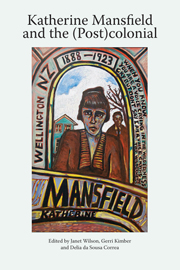Book contents
- Frontmatter
- Contents
- List of Illustrations
- Acknowledgements
- Colophon
- Introduction
- Criticism
- Katherine Mansfield: Cannibal
- Mansfield as (Post) colonial-Modernist: Rewriting the Contract with Death
- Colonialism and the Need for Impurity: Katherine Mansfield, ‘The Garden Party’ and Postcolonial Feeling
- ‘How Katherine Mansfield was Kidnapped’: A (Post) colonial Family Romance
- ‘Unmasking’ the First-Person Narrator of In a German Pension
- Workmanship and Wildness: Katherine Mansfield on Edith Wharton's The Age of Innocence
- Home and Abroad in the South Pacific: Spaces and Places in Robert Louis Stevenson and Katherine Mansfield's Short Fiction
- Literatures of Expatriation and the Colonial Mansfield
- Creative Writing
- Reports
- Reviews
- Notes on Contributors
- Katherine Mansfield Society
Literatures of Expatriation and the Colonial Mansfield
from Criticism
Published online by Cambridge University Press: 05 March 2014
- Frontmatter
- Contents
- List of Illustrations
- Acknowledgements
- Colophon
- Introduction
- Criticism
- Katherine Mansfield: Cannibal
- Mansfield as (Post) colonial-Modernist: Rewriting the Contract with Death
- Colonialism and the Need for Impurity: Katherine Mansfield, ‘The Garden Party’ and Postcolonial Feeling
- ‘How Katherine Mansfield was Kidnapped’: A (Post) colonial Family Romance
- ‘Unmasking’ the First-Person Narrator of In a German Pension
- Workmanship and Wildness: Katherine Mansfield on Edith Wharton's The Age of Innocence
- Home and Abroad in the South Pacific: Spaces and Places in Robert Louis Stevenson and Katherine Mansfield's Short Fiction
- Literatures of Expatriation and the Colonial Mansfield
- Creative Writing
- Reports
- Reviews
- Notes on Contributors
- Katherine Mansfield Society
Summary
Mansfield's Literary Contexts
In a novel of 1891 the following observation is made:
I should think that to a young lady so much isolation from society and the constant sameness and tameness of everyday life in a wilderness like this, must be very irksome in comparison to the pleasure and gaiety of living in the town.
Initial scrutiny might suggest that this passage is from a British novel yet in fact it belongs to a version of the colonial genre. Among the clues is the misleading assertion that town and country, cultivated interiors, social manners and landscapes, are successfully recreated. However, the tone of the novel from which the quotation is taken, Dugald Ferguson's Vicissitudes of Bush Life in Australia and New Zealand (1891), suggests that we could indeed be far from ‘home’, that is, England. Looking at the novels of empire, particularly those of the nineteenth-century social diaspora, we might well question what are the assumptions in fictional representations of the new society when ‘place’ does not quite exist. What embryonic symbols will emerge, when, despite assurances of sameness, of a presumed close accord and continuity with Britain, a sense of the incomplete nonetheless continues to persist instead? If the condition of expatriation affects the nineteenth-century colonist, how will Mansfield, writing in the twentieth century as an expatriate author and modernist, be affected as she looks back to the same society as the country of her birth?
- Type
- Chapter
- Information
- Katherine Mansfield and the (Post)colonial , pp. 116 - 126Publisher: Edinburgh University PressPrint publication year: 2013

